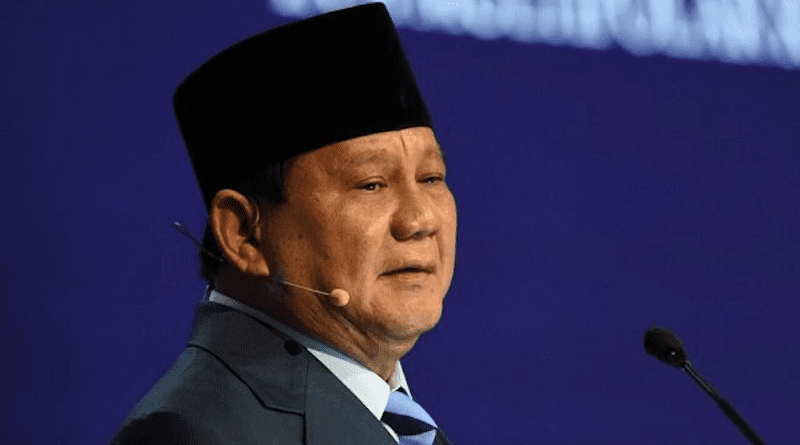Indonesia’s Foreign Policy Shifts: A New Chapter With Prabowo – OpEd
As Indonesia anticipates the transition in leadership with President-elect Prabowo Subianto poised to assume office, there is a pressing need to scrutinize the trajectory of the nation’s foreign policy. The impending change raises questions about whether Prabowo’s approach will uphold the existing foreign policy framework established by President Joko Widodo (Jokowi) or introduce significant shifts. This thesis delves into an examination of Prabowo’s foreign policy priorities, with a specific focus on key areas such as ASEAN, the South China Sea, USA-China rivalries, relations with Australia and New Zealand, economic policies, and his interest in the Russian-Ukraine war. By analyzing these dimensions, we aim to shed light on the potential continuities or divergences in Indonesia’s foreign policy under Prabowo’s leadership. This exploration is crucial for understanding Indonesia’s evolving role in regional and global affairs amidst the changing geopolitical landscape.
President-elect Prabowo Subianto’s foreign policy towards ASEAN, the South China Sea, and the USA-China rivalries is anticipated to be a focal point of his administration’s diplomatic agenda. Given Indonesia’s historical role in fostering regional stability and cooperation within ASEAN, Prabowo is likely to prioritize strengthening intra-regional relations, bolstering economic cooperation, and addressing common security challenges. However, his approach to contentious issues such as the South China Sea disputes may diverge from the assertive stance taken by his predecessor, President Joko Widodo (Jokowi). While Jokowi advocated for upholding maritime rights and pursuing peaceful resolutions through multilateral mechanisms, Prabowo’s stance on the matter remains to be clarified.
Regarding the USA-China rivalries, Prabowo may adopt a pragmatic approach aimed at balancing Indonesia’s strategic interests between the two superpowers. Despite maintaining robust economic ties with China, Prabowo may seek to deepen Indonesia’s security cooperation with the United States, particularly in areas such as maritime security and counterterrorism efforts. However, navigating the complex dynamics of the USA-China rivalry poses a challenge, and the extent to which Prabowo will prioritize one relationship over the other remains uncertain. As Indonesia aims to maintain its position as a key player in the Asia-Pacific region, Prabowo’s foreign policy decisions regarding ASEAN, the South China Sea, and the USA-China rivalries will significantly shape Indonesia’s diplomatic trajectory in the coming years.
President-elect Prabowo Subianto’s approach towards Australia and New Zealand is anticipated to be pragmatic, focusing on mutual interests and cooperation. Both countries hold strategic significance for Indonesia in trade, investment, and security. Prabowo may prioritize enhancing bilateral relations, particularly in areas of economic partnership and defense cooperation. However, historical tensions and unresolved issues, such as maritime boundary disputes and human rights concerns, could pose challenges to the relationship. Prabowo’s administration may seek to address these issues through diplomatic engagement and dialogue, aiming to foster greater understanding and collaboration between Indonesia and its neighbors. Overall, while opportunities for cooperation exist, navigating these challenges will require careful diplomacy and a commitment to mutual respect and understanding.
President-elect Prabowo Subianto’s economic policy is expected to maintain continuity with Jokowi’s focus on economic development, infrastructure investment, and foreign investment attraction. However, Prabowo may introduce adjustments to address domestic priorities like job creation, poverty reduction, and industrial growth. These adjustments could lead to changes in trade policies and investment incentives, reflecting Prabowo’s emphasis on addressing key socio-economic challenges facing Indonesia. Despite potential adjustments, Prabowo’s economic agenda is likely to align with Jokowi’s overarching goal of fostering economic growth and development in the country.
President-elect Prabowo Subianto’s interest in the Russian-Ukraine war presents both challenges and opportunities for Indonesia’s foreign policy. As a non-aligned country with a history of advocating for peaceful conflict resolution, Indonesia has the potential to play a constructive role in promoting peace and stability in the region. Prabowo may leverage Indonesia’s diplomatic influence to encourage dialogue and mediation efforts, working towards a peaceful resolution of the conflict. By engaging with relevant stakeholders and international partners, Indonesia can contribute to de-escalating tensions and facilitating a negotiated settlement to the crisis.
However, navigating the complexities of the Russian-Ukraine war requires careful diplomacy and strategic decision-making. Indonesia must balance its commitment to peace and stability with its respect for sovereignty and non-interference principles. Prabowo’s leadership will be crucial in guiding Indonesia’s foreign policy approach to this conflict, ensuring that it aligns with the country’s values and interests while promoting regional and global stability.
In conclusion, President-elect Prabowo’s foreign policy agenda will significantly influence Indonesia’s role in the international arena and its relations with key partners. While there may be areas of continuity with Jokowi’s policies, such as ASEAN centrality and economic development, Prabowo’s leadership may also introduce changes or adjustments to address emerging challenges and priorities. By carefully analyzing Prabowo’s foreign policy priorities and approaches, Indonesia can navigate the complexities of the international landscape and advance its national interests effectively.
The opinions expressed in this article are the author’s own.
References:
- “Prabowo Subianto.” Wikipedia, Wikimedia Foundation, 14 March 2024, en.wikipedia.org/wiki/Prabowo_Subianto.
- “Joko Widodo.” Wikipedia, Wikimedia Foundation, 14 March 2024, en.wikipedia.org/wiki/Joko_Widodo.
- Mahendra, Hadi Kurniawan. “Indonesia’s Foreign Policy under Jokowi’s Administration: A Critical Review.” Journal of ASEAN Studies, vol. 6, no. 1, 2018, pp. 1-15.
- Batubara, Abi. “Indonesia’s Role in South China Sea Dispute: The Challenge of Asserting National Interests.” The Indonesian Quarterly, vol. 44, no. 2, 2016, pp. 153-176.
- “Indonesia and the South China Sea.” Lowy Institute, 2019, www.lowyinstitute.org/issues/south-china-sea/indonesia-and-south-china-sea.
- Hasan, Mohamed Ariff. “Indonesia–Australia Relations: A Changing Dynamic.” Australian Journal of International Affairs, vol. 75, no. 5, 2021, pp. 437-454.
- “Australia-Indonesia Relations.” Australian Government Department of Foreign Affairs and Trade, www.dfat.gov.au/geo/indonesia/Pages/indonesia-country-brief.
- Aspinall, Edward. “New Zealand-Indonesia Relations: A Deficit of Mutual Interest.” Asia Dialogue, 28 February 2018, theasiadialogue.com/2018/02/28/new-zealand-indonesia-relations-a-deficit-of-mutual-interest/.
- “Indonesia Economic Outlook.” FocusEconomics, 2022, www.focus-economics.com/countries/indonesia.

